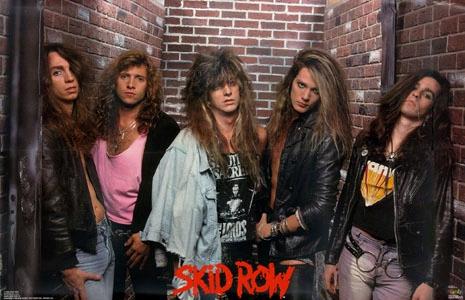|
|
 |
                      |
 |
 |
|
 |
 |

Skid Row was the last
hair band to make it before Grunge stole the airwaves. Ironically, Nirvana went under the name of Skid Row in the late 80’s.
Skid Row featured Sebastian Bach on vocals, and ex-Bon Jovi guitarist Dave “The Snake” Sabo. Only their first
two albums ever sold, and the band had disbanded by 1995. The band has since then re-banded with new singer Johnny Solinger,
and have opened for KISS’ 2004 Farewell Tour, along with recording a new album, Thickskin.
|
 |
 |
|
 |
|
 |
 |
|
Skid Row was one of the last hair metal bands
to hit the mainstream before grunge took over in the early '90s. They were also arguably the last of such bands to have any
originality. While their 1989 self-titled release used standard pop-metal riffs and contained a handful of generic lyrics,
1991's Slave to the Grind and 1995's Subhuman Race broke away from the pop-metal mold with uncharacteristically
hard, thrashy guitars and more unique songwriting while still relying on varying '80s metal formulas. Though personal differences
and changing trends would eventually tear the band apart by 1996, Skid Row showed a tremendous amount of promise during
their short run in the mainstream.
Skid Row was formed in 1986 by bassist Rachel Bolan and
former Bon Jovi guitarist Dave "the Snake" Sabo. The pair added guitarist Scotti Hill, drummer Rob
Affuso, and vocalist Sebastian Bach to the lineup by early 1987 and the band spent the next year and a half playing
a series of local clubs in the eastern U.S. Still in connection with Jon Bon Jovi, Sabo convinced the established
rock star to land Skid Row a record deal with Mercury. In 1989, the band released their first album, Skid
Row, which went multi-platinum on the strength of the Top 40 singles "18 and Life" and "I Remember You."
Success was not without backlash, however -- the band had naively signed away much of their royalties and Sebastian Bach's
childlike behavior would land the group in additional trouble. During the subsequent tour, Bach received harsh criticism
for a T-shirt he publicly sported displaying the message: AIDS KILLS FAGS DEAD. Suits were also filed against Bach
after a concert during the supporting tour, where the singer allegedly threw a glass bottle into the crowd, injuring a young
female fan. Nonetheless, Skid Row retained a devoted audience -- 1991's Slave to the Grind debuted at number
one on the Billboard Charts, an unprecedented accomplishment for a metal band. While the album did not chart any real radio
hits, Grind received stronger critical praise and would eventually reach platinum status. Like so many of their peers,
Skid Row lost much of their fan base during the grunge phase of the '90s. As Nirvana stormed the scene in 1992,
Skid Row took a hiatus, waiting out the grunge period and pondering breakups (ironically, Nirvana had once gone
under the name Skid Row in the '80s). Skid Row returned in 1995 with Subhuman Race, which surprisingly
charted in the Top 40 but otherwise did not attract any real attention. During the supporting tour, tensions between the group
members ran high and Skid Row disbanded shortly afterwards. Bach went on to form the Last Hard Men with
Smashing Pumpkins drummer Jimmy Chamberlin, but the group broke up after recording a cover of Alice Cooper's
"School's Out" for the Scream soundtrack in 1996. Plans to record new songs for the Skid Row greatest
hits album, 1998's Forty Seasons, fell through, as Bach went on to form a solo project and portray the title
role in the Broadway musical Jeckyll and Hyde. In mid-2000, Skid Row reformed with new singer Johnny Solinger
and toured as the opening band for KISS' Farewell Tour. ~ Barry Weber, All Music Guide
Copyright © 2004-2006, Only-Rock. All Rights Reserved. Do not use any materials without permission from Only-rock through
the Comment Form. All Logos and or likenesses thereof are Copyright protected, and are property of each respective band listed.
 |
|






|
|






|
|